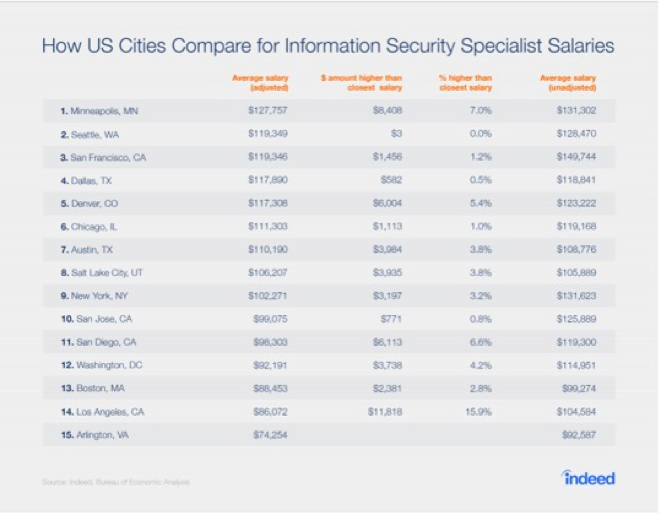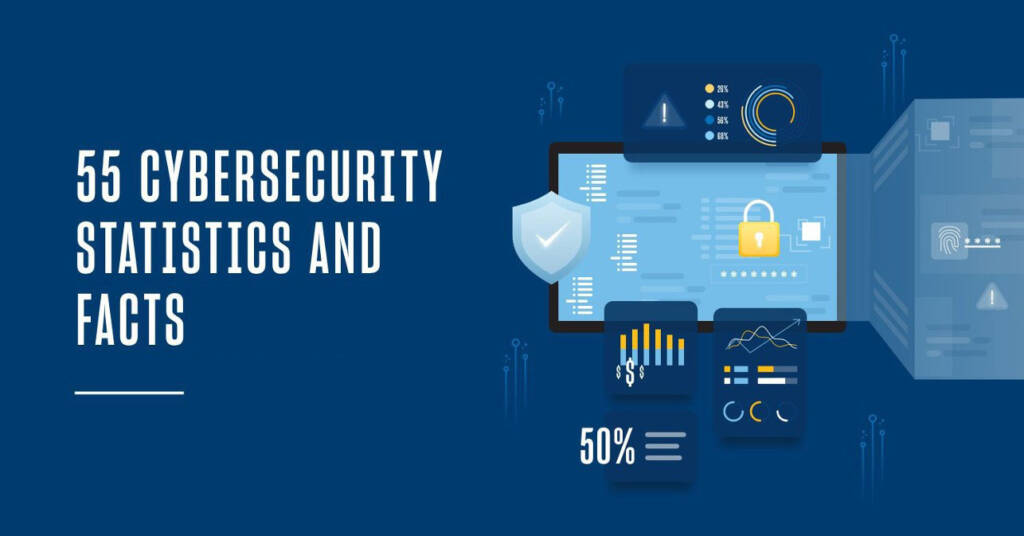The National Security Agency, Wendy’s, Target, Home Depot, Experian, the FBI and the list goes on. Cyber criminals are successfully penetrating even the most high-profile companies and governmental agencies. The breach at the NSA was truly alarming and just one recent example of the dire situation the country, and world, face as cyber crime intensifies and the cyber security talent shortage becomes more serious.
In an effort to combat the growing cyber threat, the government, private and public sectors are promoting the field and encouraging education as a way to gain the necessary qualifications and knowledge to begin a computer security career. For those interested in pursuing a career in the field, a master’s degree is often essential. And while a master’s degree can be a significant investment in both time and money, the return on investment is almost guaranteed — just look at the statistics for proof.
The Evidence is in the Numbers: We Need More Experts with Computer Security Degrees
As a result of the increasing number and sophistication of cyber threats, the cyber security market is expected to grow from $75 billion in 2015 to $170 billion by 2020, according to Forbes, which means the job outlook is strong and salaries are soaring. Here are some of the stats that illustrate the current cyber security landscape — from data breach data to job outlook to salaries and education.
Job Outlook
- “The cybersecurity market is expected to grow from $75 billion in 2015 to $170 billion by 2020.” (Source: Forbes)
- “The job market for information-security analysts, including cyber security professionals, is set to grow 36.5% by 2022, with 27,400 jobs being added.” (Source: U.S. Labor Department’s Bureau of Labor Statistics)
- “There are 209,000 unfilled cybersecurity jobs in the US and postings are up 74% over the last five years.” (Source: Forbes)
- “The cybersecurity workforce shortfall will range from 1 million to 2 million positions by 2019, according to the Center for Strategic and International Studies.” (Source: UPI)
- “Nearly 75% of security professionals say they do not have enough staff to defend their organizations against current threats, according to a survey from the Black Hat USA computer conference.” (Source: PRNewswire)
- “82% of organizations expect a cyberattack, yet 35% are unable to fill open security jobs.” (Source: RSA)
Salaries
- Cybersecurity jobs in the United States pay an average of $6,500 more annually than other IT professions, a 9% premium.” (Source:Intel)
- Top cyber security salaries in some U.S. metro areas have skyrocketed as high as $380,000/yr. (Source: Forbes)
- Research firm IDCpredicts that “by 2018, fully 75% of chief security officers (CSO) and chief information security officers (CISOs) will report directly to the CEO, not the CIO.” When CISO positions elevate to the C-Suite alongside chief financial officers and chief operating officers, it will arguably move the salary needle into the half-million dollar range for some. (Source: Forbes)
Data Breaches
- “In 2015, there were over 112 million healthcare data breaches.” (Source:Forbes)
- Data breaches now cost an average of $4 million.” (Source:InfoSecurity)
- 2015 research note from Barclays stated that the U.S. is responsible for 47% of the world’s card fraud despite only accounting for 24% of total worldwide card volume. The most highly publicized credit card breaches in recent years:
- eBay: 145 million records accessed.
- Home Depot: 109 million records accessed.
- JP Morgan Chase: 83 million records accessed.
- Michael’s Stores: 3 million records accessed.
- Staples: 1.16 million records accessed.
- Domino’s Pizza: 650,000 records accessed.
- Sony Pictures Entertainment: 47,000 records accessed.
- Target: 40 million credit card numbers and 70 million addresses accessed.
- Nieman Marcus: 350,000 cardholders impacted.
(Source: Nasdaq)
- “According to the Mobile Security and Risk Reviewreport for Q2 2016, less than 5% of enterprises are using mobile threat detection software and only 8% have an enforced operating system update policy in place. Furthermore, 40% of enterprises experienced missing devices (a 7% increase from Q4 2015) and 27% had out of date policies (up from 20% in Q4 2015).” (Source: BetaNews)
- “According to statistics from The Risk Management Group, 160 million phishing emails were sent (globally) daily in 2015 – 10% of these (or 16 million) penetrated conventional spam filters. However, of these 16 million, half (8 million) were read and a surprising 10% of people who read the emails (800,000 people) then clicked on links, potentially allowing malware and virus into their computer network. Frighteningly, 10% of people (80,000) then provided personal data.” (Source: MondoeVisione)
Education
- “The Office of Personnel Management announced the Federal Cybersecurity Workforce Strategy in July. It includes a proposal to invest $62 million to expand cybersecurity education in fiscal 2017. Some of the funds would go to a CyberCorps: Scholarship for Service program that would provide scholarships to students in cybersecurity training programs.” (Source:UPI)
- “This shortage in cybersecurity skills does direct and measurable damage, according to 71% of respondents. One in three say a shortage of skills makes their organizations more desirable hacking targets. One in four say insufficient cybersecurity staff strength has damaged their organization’s reputation and led directly to the loss of proprietary data through cyberattack. According to an Intel survey of 775 IT decision makers across 8 countries.” (Source:Intel)
Pursuing a Computer Security Degree
The state of cyber security today is dire and the need for skilled computer security experts is immense. According to a survey by Intel, Hacking the Skills Shortage, A Study of the International Shortage in Cybersecurity Skills, “high-value skills are in critically short supply, the scarcest being intrusion detection, secure software development and attack mitigation. These skills are in greater demand than soft skills in communication and collaboration. A majority of respondents (53%) said that the cybersecurity skills shortage is worse than talent deficits in other IT professions.”
In order to gain these in-demand skills and the level of expertise necessary to combat sophisticated cyber attacks, education is critical. In fact, a bachelor’s degree is the absolute minimum requirement for most cyber security jobs, while a master’s degree is highly preferred.
When considering higher education it is important to carefully evaluate the programs available and what each offers. Because cyber security is a constantly evolving field, you should choose a degree program that offers hands-on learning and is taught by current field practitioners. Additionally, be sure to evaluate the different program formats available. Today there are online and hybrid computer security degree program options, which are often attractive to working professionals who need to balance school with work or family.
What Jobs are Available with a Computer Security Master’s Degree?
“The cybersecurity job market is on fire,” Veronica Mollica, founder and executive information security recruiter at Indigo Partners Inc., told Forbes. “Our candidates are facing competing offers from multiple companies with salary increases averaging over 30%. Current employers are scrambling to retain talent with counter offers including 10% and higher salary increases for information security team members to remain on board.” Needless to say, there are a number of jobs available to those with a master’s degree in computer security.
| Job Title | Average Yearly Salary |
| Information Security Analyst | $49,003 – $102,219 |
| Lead Software Engineer | $233,333 |
| Chief Information Security Officer | $192,500 |
| Security Architect | $81,845 – $147,873 |
| Penetration Tester | $45,192 – $120,163 |
| Forensics Expert | $55,703 – $119,079. |
| Computer, networking or IT security consultant | $81,000 |
| Information Security Manager | $100,000 |
Where are the Computer Security Jobs Located?
Cyber security jobs are plentiful across almost every state and sector. But when it comes to the top paying geographies, Indeed ranks Minneapolis, MN, as number one, with three California cities ranking in the top 15.

If you are interested in entering the field of cyber security and doing important, meaningful work in the battle against cyber crime, consider furthering your education with a computer security or cyber security degree.
The University of San Diego offers two cyber security master’s degree programs— the Master of Science in Cyber Security Engineering and the Master of Science in Cyber Security Operations and Leadership. Both programs are academically rigorous and focused entirely on modern cyber security mitigation with an emphasis on teaching students how to become effective lifelong learners — a skill of immense importance in the ever-evolving world of cyber crime and security.
Depending on which path you choose, engineering or leadership, your curriculum could include classes such as:
- Applied Cryptography
- Secure Systems Architecture
- Cyber Security Risks Management
- Secure Software Design and Development
- Secure Systems Engineering
- Digital Forensics and Incident Response
- And many more!
If you’re interested, consider taking a moment to review the full leadership curriculum or the engineering curriculum. If you’re ready to learn more about what a USD computer security degree can do for you, speak with an admissions advisor today.




